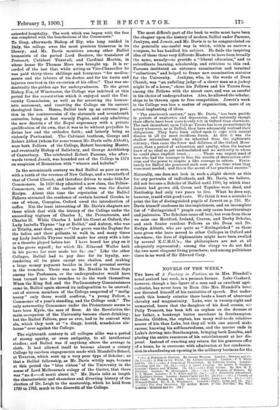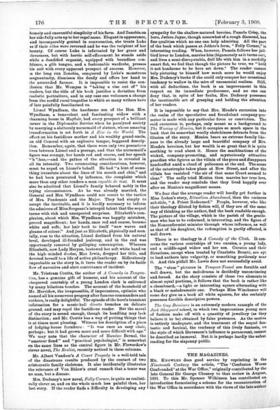NOVELS OF THE WEEK.*
THE hero of A Fantasy in Fustian, as in Mrs. Blundell's novel noticed last week, is a yeoman farmer. Luke Gaskard, however, though a fine figure of a man and an excellent agri- culturist, has never been to Eton (like Mrs. Blundell's hero) nor divested himself of his rusticities of speech. But under- neath this homely exterior there beats a heart of abnormal chivalry and magnanimity. Luke, who is twenty-eight and unmarried, hears that the daughter of his dead cousin, nee Polly Trusoott, has been left an orphan on the decease of her father, a bankrupt butter merchant in Southampton. Zenobia. Gliddon, the orphan, has many well-to-do relatives nearer of kin than Luke, but they all with one accord make excuse, knowing his softheartedness, and the matter ends in Luke's driving into Southampton, bringing back Zenobia, and placing the entire resources of his establishment at her dis- posal. Instead of exacting any return for his generous offer of a home, he is overcome with admiration at her condescen- sion in abandoning an opening in the millinery business for the (1.) A Fantasy in Fustian. By George Wemyss. London : Downey and Co. [6s.]—(2.) A Rise in the World. By Adeline Sergeant. London : F. V. White and Co. [6s.]—(3.) A Comedy of Temptation. By Tristram Coutts London : Greening and Co. [3s. 6d.]—(4.) A Court Tragedy. By Albert D. Vandam. London : Chatto and Winclus. [3s. 6d.]—(5.) Folly Corner. By Mrs. H. E. Dudeney. London : W. Heinemann. [6s.]--(6.) The Wooing of Monica. By L. T. Meade. London : F. V. White and Co. [es.] ----(7.) Ritualism Abandoned. By Kathleen Ireton. London : James Clarke and Co. (3s. ad.]--(M.) A Comedy of the Cloth. By Thomas A. Lewis. London : Dlgby, Long, and Co. [8s.]---(9.) Tempest-Tossed. By M. E. Winchester. London : Digby, Long, and Co. [Cs.] ----(10.) The Gay Deceivers. By Arthur Moore. (•' The Novelist," No. VII.) London : Methuen and Co. [6d.)
homely and uneventful simplicity of his farm. And Zenobia on her side fully acts up to her regal name. Elegant in appearance, and incomparably genteel in conversation, she treats Luke as if their roles were reversed and he was the recipient of her bounty. Of course Luke is infatuated by her grace and cleverness, but with heroic self-effacement he stands aside while a dandified organist, equipped with boundless con- fidence, a glib tongue, and a fashionable wardrobe, presses his suit with every apparent prospect of success. However, in the long run Zenobia, conquered by Luke's monstrous magnanimity, dismisses the dandy and offers her hand to the astounded farmer. It is impossible to resist the con- clusion that Mr. Wemyss is "taking a rise out of" his readers, but the title of his book justifies a deviation from realistic portraiture, and in any case one welcomes a change from the sordid rural tragedies to which so many writers have late painfully familiarised us.
Lionel Wyndham, the handsome son of the Hon. Mrs. Wyndham, a benevolent and fascinating widow with a charming house in Mayfair, had every prospect of a brilliant -.weer in the Diplomatic Service when he paralysed society by marrying a slatternly nursemaid of sixteen, whose amazing transformation is set forth in A Rise in the World. The effect on his fastidious mother and his wealthy grand-uncle, an old General with an explosive temper, beggared descrip- tion. Remember, again, that there were only two precarious lives between Lionel and a peerage, and that the nursemaid's figure was stumpy, her hands red and coarse, and her speech " h "-less,—and the pathos of the situation is revealed in all its intensity. Two extenuating considerations, however, must be urged on Lionel's behalf. He had "a hint of some- thing irresolute about the lines of his mouth and chin," and he had been prostrated by influenza, the complaint which more than any other renders a man capable de tout. It must also be admitted that Lionel's family behaved nobly in the trying circumstances. As he was already married, the General and Mrs. Wyndham could not resort to the tactics of Mrs. Pendennis and the Major. They had simply to accept the inevitable, and it is hardly necessary to inform the admirers of Miss Sergeant's intrepid talent that the sequel teems with rich and unexpected surprises. Elizabeth's com- plexion, about which Mrs. Wyndham was happily mistaken, proved magnificent; her hands, once red and coarse, became white and soft; her hair took to itself "new waves and gleams of colour." And just as Elizabeth, physically and men_ tally, rose to the situation, Lionel declined from his natural level, developed ill-founded jealousy, and in the end was opportunely removed by galloping consumption. Whereon Elizabeth, now Lady Meryon, bestowed her soft white hand on the high- minded doctor, Max Irwin, dropped her title, and devoted herself to a life of active philanthropy. Ridiculously improbable as the story is, it lures the reader on by its facile flow of narrative and alert contrivance of incident.
Mr. Tristram Coutts, the author of A Comedy in Tempta- tion, has a genuine gift of humour, and his account of the chequered courtship of a young London clerk is enlivened by many hilarious touches. The account of the household of Mr. Merridew, the irrepressible, if impecunious, optimist who named all his numerous progeny after famous commanders and authors, is really delightful. The episode of the hero's transient infatuation for a music-hall divette trenches on delicate ground, and may repel the fastidious reader. But the moral of the story is sound enough, though its handling may lack distinction; and Mr. Contta has a way of putting things that is at times most pleasing. Witness his description of a piece of lodging-house furniture : "It was once an easy chair, perhaps; but it bad grown more and more difficult with age." We may note that the character of Maurice Bernal, the "amateur fiend" and "practical psychologist," is somewhat on the same lines as the central figure in Mr. Flowerdew's clever novel, The Realist, recently noticed in these columns.
Mr. Albert Vandam's A Court Tragedy is a well-told tale of the disastrous results produced by the contact of two aristocratic family skeletons. It also incidentally illustrates the relevance of Von Wilow's cruel remark that a tenor was no man, but a disease.
Mrs. Dudeney's new novel, Folly Corner, is quite as realisti- cally clever as, and on the whole much less painful than, her last story. If the reader finds a difficulty in developing any sympathy for the shallow-natured heroine, Pamela Crisp, the hero, Jethro Jayne, though somewhat of a rough diamond, has fine qualities which no one can help admiring. All the part of the book which passes at Jethro's farm, " Folly Corner," is interesting reading. When, however, Pamela follows her jail- bird lover to London, marries him (bigamously as it turns out), and lives a semi-disreputable, dull life with him in a sordidly smart flat, we feel that though the picture be true, we "hold it not handsome to be here set down." The reader cannot help picturing to himself how ranch more he would enjoy Mrs. Dudeney's books if she could only conquer her occasional tendency to wallow in the mire of unessential realism. Still, with all deductions, the book is an improvement in this respect on its immediate predecessor, and no one can deny that, in spite of her faults, Mrs. Dudeney possesses the inestimable art of grasping and holding the attention of her readers.
It is impossible to say that Mrs. Meade's excursion into the realm of the speculative and fraudulent company-pro- moter is made with any particular force or conviction. The said excursion is, perhaps, only meant as a background to The Wooing of Monica, but it occupies so much space in the book that its somewhat woolly sketchiness detracts from the illusion of the story. Monica bears an extreme family like- ness to the already large and beautiful company of Mrs. Meade's heroines, but her wealth is so great that it is quite soothing to read about it. Hence the machinations of the wicked, company-promoting, and mysteriously attractive guardian who figures as the villain of the piece and disappears handcuffed amid a cloud of policemen at the end. The scene of the catastrophe takes place at Bow Street, and after the villain has vanished "the air of that same Court seemed to clear." The sadly tried Monica then marries her true love, and the reader may conclude that they lived happily ever after on Monica's magnificent means.
We fear that the average reader will hardly get further in Miss Ireton's story, Ritualism Abandoned, than the ominous sub-title, "A Priest Redeemed." People, however, who like their theology diluted by fiction will, if they are of the same way of thinking as the author, find the book readable enough. The picture of the village, which is the parish of the gentle- man who has to be redeemed, is interesting, and the figure of the Nonconformist minister through whose influence, as well as that of his daughter, the redemption is partly effected, is well drawn.
There is no theology in A Comedy of the Cloth. It con- cerns the various courtships of two curates, a young lady, and a middle-aged widow and her son. Curates and their flirtations, except when treated by Charlotte Bronte, are apt to lead authors into vulgarity, or something perilously near it. And this pitfall Mr. Lewis does not successfully avoid.
The " slum " pictures in Tempest-Tossed are forcible and well drawn, but the melodrama is decidedly unconvincing and forced. As the story consists of these two elements in almost equal portions, it follows that the book is rather like a chessboard,—a light or interesting square alternating with a black or melodramatic one. Perhaps Miss Winchester will some day give us a book all white squares, for she certainly possesses forcible descriptive powers.
The Gay Deceivers is an extremely modern example of the Jack Sheppard school, in which two impecunious young men of fashion make off with a quantity of jewellery (as they believe it to be) obtained by false pretences. As the motive is entirely inadequate, and the treatment of the sequel fan- tastic and farcical, the tendency of this lively fantasia, on the style of which Stevenson's influence is paramount, cannot be described as immoral. But it is perhaps hardly the safest reading for the sixpenny public.







































 Previous page
Previous page